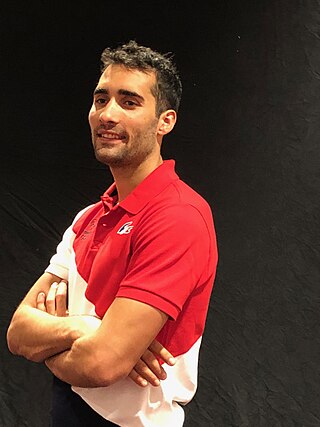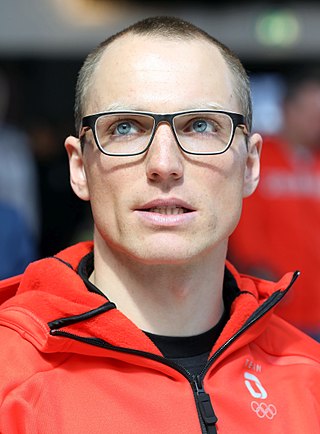
Tomasz Sikora is a former Polish biathlete.
Peter Angerer is a former West German biathlete.
Johann Passler is a former Italian biathlete. At the 1988 Olympics in Calgary, Passler won bronze medals in the 20 km and in the relay. At the World Championships, Passler won two gold medals and two bronze.
Andreas Zingerle is an Italian former biathlete. At the 1988 Olympics in Calgary, Zingerle won a bronze medal in the relay. At the World Championships Zingerle accumulated one individual gold medal and three golds and a bronze in relay and team events.
Patrick Favre is a former Italian biathlete. At the Biathlon World Championships 1997 in Osrblie he won a bronze medal with the Italian relay team. Two years later at the Biathlon World Championships 1999 in Kontiolahti he won a silver medal in the sprint event. In the 1994–95 season he came second in the overall World Cup behind Jon Åge Tyldum. After the 2000–01 season, he retired as biathlete, though he had a short-lived comeback during the 2003–04 season. Following his retirement, he became a coach, spending seven years with the Italian national biathlon team before joining the French national men's biathlon team in June 2018 on a four-year contract.
Wilfried "Willi the Kid" Pallhuber is a former Italian biathlete. At the 2006 Winter Olympics in Turin he competed in his fifth olympics.
René Cattarinussi is a former Italian biathlete.

Magdalena "Lena" Holzer is a retired German professional biathlete. She is the most successful woman of all time at Biathlon World Championships and a two-time Olympic gold medalist. At the age of 21, she became the youngest Overall World Cup winner in the history of the International Biathlon Union (IBU). With 34 World Cup wins, Holzer is ranked second all-time for career victories on the Biathlon World Cup tour. She has won the Overall World Cup title three times, in 2007–08, in 2009–10 and her final season in 2011–12. At only 25 years old, Holzer retired from the sport in March 2012, citing a lack of motivation and her desire for a normal life.

Tarjei Bø is a Norwegian professional biathlete. Awarded Olympic gold medals, World Championship gold medals and World Cup victories from 2010 to 2022. Bø debuted in the Biathlon World Cup on 26 March 2009 in Khanty-Mansiysk, Russia. In the 2010 Winter Olympics, he earned his first gold medal in the 4 × 7.5 km biathlon relay. On 10 December 2010 he won the World Cup sprint race in Hochfilzen, his first world cup victory. He also won the following pursuit race and anchored the winning relay team. Bø is the older brother of biathlete Johannes Thingnes Bø.

Martin Fourcade is a retired French biathlete. He is a six-time Olympic champion, a thirteen-time World Champion and a seven-time winner of the Overall World Cup. As of February 2018, he is the most successful French Winter Olympian of all time. Fourcade is the all-time biathlon record holder of overall World Cup titles with seven big crystal globes and he's also the all-time record holder of the most consecutive Major Championships titles with at least one non-team gold medal in every major championship from 2011 to 2018.

Erik Lesser is a German former biathlete. In 2010, he ran his first single World Cup Race. At the 2014 Winter Olympics in Sochi, he won a silver medal at Men's individual. At the Biathlon World Championships 2013 he won a bronze medal with the German team in Men's relay.
Hubert Leitgeb was an Italian biathlete.

Susan Dunklee is a retired American biathlete.
The 1982–83 Biathlon World Cup was a multi-race tournament over a season of biathlon, organised by the UIPMB. The season started on 27 January 1983 in Ruhpolding, West Germany, and ended on 11 March 1983 in Holmenkollen, Norway. It was the sixth season of the Biathlon World Cup, and the first in which women were allowed to compete in their own European Cup. Though called the European Cup, participation was not restricted to Europeans.
The 1985–86 Biathlon World Cup was a multi-race tournament over a season of biathlon, organised by the UIPMB. The season started on 16 January 1986 in Antholz-Anterselva, Italy, and ended on 16 March 1986 in Boden, Sweden. It was the ninth season of the Biathlon World Cup.
The 1986–87 Biathlon World Cup was a multi-race tournament over a season of biathlon, organised by the UIPMB. The season started on 18 December 1986 in Obertauern, Austria, and ended on 15 March 1987 in Lillehammer, Norway. It was the tenth season of the Biathlon World Cup. The first round of the World Cup was originally going to be held in Hochfilzen, Austria, but the races were moved to Obertauern due to a lack of snow.
The 1987–88 Biathlon World Cup was a multi-race tournament over a season of biathlon, organised by the UIPMB. The season started on 17 December 1987 in Hochfilzen, Austria, and ended on 20 March 1988 in Jyväskylä, Finland. It was the 11th season of the Biathlon World Cup. The women's European Cup changed its name to World Cup.
The 1988–89 Biathlon World Cup was a multi-race tournament over a season of biathlon, organised by the UIPMB. The season started on 15 December 1988 in Albertville, France, and ended on 19 March 1989 in Steinkjer, Norway. It was the 12th season of the Biathlon World Cup.
Vladimir Velichkov is a Bulgarian former biathlete. He was among the best biathletes during the 1980s and he is generally recognised as the greatest male Bulgarian biathlete of all time.

Vetle Sjåstad Christiansen is a Norwegian biathlete.






